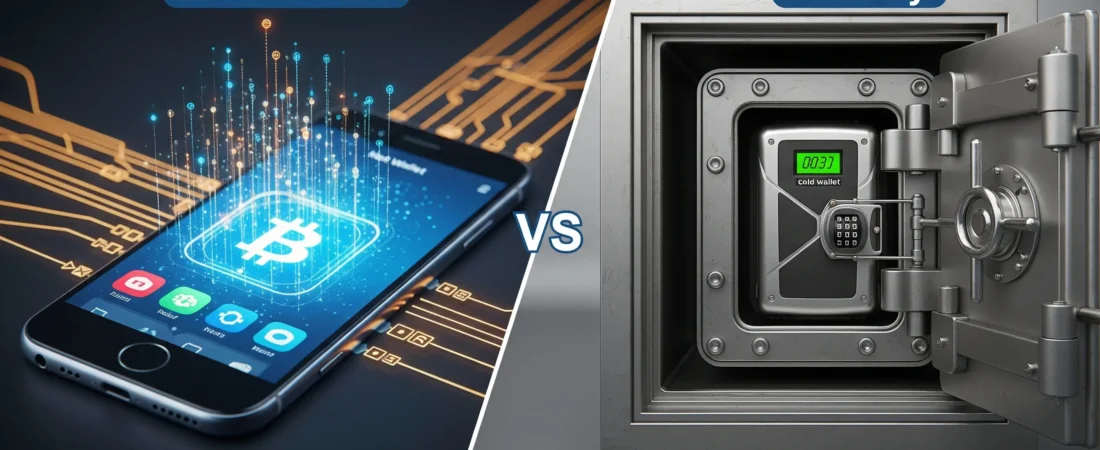This guide explains the difference between hot vs cold crypto wallets. Understanding hot vs cold crypto wallets is key to security. We compare the features of hot vs cold crypto wallets.
In cryptocurrency, the famous saying goes: “Not your keys, not your crypto.” But where should you keep those all-important private keys? The answer lies in a crypto wallet, and your choice of wallet is the single most important security decision you will ever make.
This guide will demystify the two main types of wallets by explaining the critical differences between hot vs cold crypto wallets, helping you decide which is right for your needs.
First, What Are “Keys” and Why Do They Matter?
Your crypto wallet doesn’t store your coins directly; it stores your cryptographic keys. Think of it like this:
- Your **Public Key** generates a public address, like your bank account number. You can share this freely with anyone to receive funds.
- Your **Private Key** is like your account password or ATM PIN. It proves you own the funds and is used to sign (authorize) outgoing transactions. **You must NEVER share your private key.**
The entire debate between hot vs cold crypto wallets is about the best way to keep this private key safe from thieves.
What Is a Hot Wallet? (The Connected Wallet)
A hot wallet is any cryptocurrency wallet that is connected to the internet. This includes browser extensions like MetaMask, desktop applications like Exodus, and mobile apps like Trust Wallet. Their constant internet connection makes them incredibly convenient for frequent trading, sending funds, and interacting with DeFi applications.
The Primary Risk:
Because they are always online, hot wallets are inherently vulnerable to online threats like hacking, malware, and sophisticated phishing attacks. If your computer or phone is compromised, a hacker could potentially access your private keys and steal your funds.
What Is a Cold Wallet? (The Offline Vault)
A cold wallet (also known as cold storage) is a method of storing your private keys completely offline, making it the gold standard for security. There are two main types:
1. Hardware Wallets
These are small, physical devices that connect to your computer via USB or Bluetooth. Popular brands include Ledger and Trezor. Transactions are signed offline within the secure chip on the device itself, meaning your keys are never exposed to the internet. This makes them immune to online attacks.
2. Paper/Metal Wallets
This is a more low-tech method where your private key and public addresses are printed or engraved onto a piece of paper or metal and stored in a safe place. While secure, they are cumbersome to use and are generally only recommended for very long-term, deep storage.
Best Practices for Wallet Security
Regardless of your choice between hot vs cold crypto wallets, follow these rules:
- Secure Your Seed Phrase: Write down your 12 or 24-word seed phrase and store it in multiple, secure, offline locations. NEVER take a photo of it or store it in a digital file. This phrase can restore your entire wallet.
- Buy Hardware From the Source: If you buy a hardware wallet, ONLY buy it directly from the manufacturer’s official website. Devices from third-party sellers could be tampered with.
- Send a Test Transaction: Before sending a large amount of crypto to a new wallet, always send a small test amount first to ensure it arrives safely.
Conclusion: Which One Should You Use?
You don’t have to choose just one. In fact, the most experienced crypto users adopt a hybrid approach for the ultimate balance of security and convenience:
- Use a Cold Wallet for the majority of your funds—your long-term investments (“HODL” stack) that you don’t plan to touch often. This is your savings vault.
- Use a Hot Wallet for a small amount of “spending money” that you use for daily transactions, trading, or interacting with dApps. This is your checking account.
This strategy minimizes your risk by exposing only a small fraction of your portfolio to online threats, as detailed in our guide to crypto scams. It provides the robust security of cold storage for your core holdings and the convenience of a hot wallet for daily use.
Securing your assets is the first and most important step in your crypto journey.
